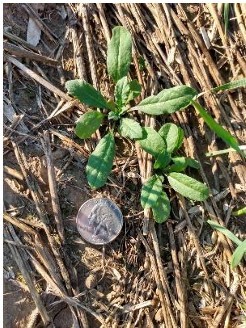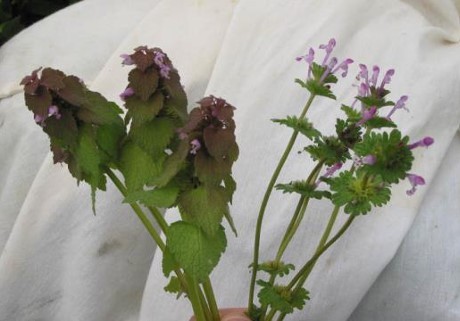Fall Weed Control Options
BY Mike Hunter: NCRAT Field Crops Specialist
Fall is an ideal time to control many of our troublesome weeds such as dandelion, chickweed, mustard, marestail, henbit and purple deadnettle (Photo 1.), present in fields after harvest. It is easier to control many of these weeds in the fall rather than waiting until spring. A fall burndown application will not always eliminate the need for a spring burndown application prior to planting but provides a broader spring burndown application window. For the control of most of our commonly found winter annuals and dandelion, consider an application of 22 oz. Roundup PowerMax (or equivalent glyphosate product) plus 1 pint (3.8 lb./gal.) 2,4D LVE. The addition of crop oil contrate may enhance dandelion control. If dandelions are the primary weed present an alternative option without using glyphosate is applying .38 to .5 oz. Express plus 1 pint (3.8 lb./gal.) 2,4-D LVE and adding crop oil concentrate according to the label.
If grasses are not present at time of application, it is not always necessary to use glyphosate. Most broadleaf weeds present in the fall can be effectively controlled with 1 pint (3.8 lb./gal.) 2,4-D LVE + 1 pint dicamba.
Marestail is a winter or summer annual weed that reproduces by seeds. Seeds can germinate in the spring, late summer or fall (Photo 2). Those seeds that germinate in late summer will overwinter as a small rosette of leaves and grow a flowering stem in the early spring. To successfully manage marestail in no till cropping systems it is important to implement control tactics in both the fall and spring. Management options for multiple resistant marestail in the fall include the use of cover crops and/or burndown herbicides.
- Planting a winter cereal cover crop such as rye has proven to be an effective strategy to suppress the growth of marestail. It works best if the cover crops are seeded early enough so that it can provide the necessary biomass to suppress the emerging annual weeds.
- No till growers that are not using fall planted cover crops should consider applying a fall burndown herbicide to control emerged marestail. Glyphosate alone will not control resistant marestail. Glyphosate can still be used to control other weeds but will require the use of either of 2,4-D ester or dicamba. The addition of 1 oz Sharpen plus 1% v/v Methylated Seed Oil (1 gal/100 gal water) will provide additional burndown of marestail. For best results with Sharpen, do not substitute crop oil contrate for the methylated seed oil.
It will soon be time for our fall burndown herbicide applications. As it gets later in the fall, pay close attention to the air temperature at time of application. A few consecutive days of daytime temperatures over 55°F and nighttime temperatures over 40°F will improve control. Scout your fields to determine what weed species are present and plan accordingly.
 Photo 2. Marestail in winter wheat stubble. Photo credit M. Hunter CCE NCRAT
Photo 2. Marestail in winter wheat stubble. Photo credit M. Hunter CCE NCRAT Photo 1. Purple deadnettle on left, Henbit on right. Photo credit M. Stanyard, CCE NWNY
Photo 1. Purple deadnettle on left, Henbit on right. Photo credit M. Stanyard, CCE NWNY Upcoming Events
Boots in the Barn: Cornell Dairy Research Updates
January 13, 2026
January 20, 2026
January 27, 2026
February 3, 2026
February 10, 2026
February 17, 2026
February 24, 2026
Join us for some or all!
New York Certified Organic (NYCO) Field Crops and Dairy Meeting
February 10, 2026
Geneva, NY
Piglet Health 101
February 13, 2026 : Piglet Health 101 - Batavia, NY
Batavia, NY
This free workshop from the New York Pork Producers offers hands-on training in essential piglet care and processing practices, led by industry veterinarians from Passion for Pigs. No matter your experience level, this training offers takeaways for both new and experienced producers.
Announcements
Cows, Crops & Critters Newsletter Sponsorship
TRYING TO REACH GROWERS AND AGRIBUSINESSES IN OUR SOUTHWEST REGION OF NEW YORK?Weekly Email Update: Shared with 625+ households who have signed up with our program.
Monthly Paper Mailer: To reach our stakeholders and farmers who lack internet access, we send out a monthly mailer where your company's logo and contact information would be featured with a mailing list of 330+ households.
If you sponsor our weekly and monthly publications you reach approximately 955 households.





